 Politics
Politics

Premier called to UK for Islamic finance meeting
 (CNS Business): Cayman Premier Alden McLaughlin and the leader of Bermuda, Craig Cannonie, have been appointed by the FCO to a new international group dealing with Global Islamic Finance and Investment, along with a number of international bankers and finance experts. Cayman is a popular jurisdiction for Islamic Finance, which is growing 50 percent faster than traditional banking. McLaughlin will be heading to London at the weekend with a delegation to attend the group’s first meeting, as well as meetings with the OT minister and, officials said, with Lord Blencathra, who, despite changes in the UK House of Lords rules, still appears to work for CIG. Read more on CNS Business
(CNS Business): Cayman Premier Alden McLaughlin and the leader of Bermuda, Craig Cannonie, have been appointed by the FCO to a new international group dealing with Global Islamic Finance and Investment, along with a number of international bankers and finance experts. Cayman is a popular jurisdiction for Islamic Finance, which is growing 50 percent faster than traditional banking. McLaughlin will be heading to London at the weekend with a delegation to attend the group’s first meeting, as well as meetings with the OT minister and, officials said, with Lord Blencathra, who, despite changes in the UK House of Lords rules, still appears to work for CIG. Read more on CNS Business

Corruption fuels multiple global challenges
 (CNS): Corruption is a significant contributing factor to world crisis of all kinds from inequity to war, the chair of transparency international told the UCCI conference audience on Wednesday. Delivering the keynote address at the opening of the ethics conference, broadcast around the world on-line, chair Dr Huguette Labelle, said the event would provide a forum to take stock of the underlying reasons why no country is immune from corruption and why leaders, managers and those who deliver public service need to work on a strong set of ethical values to beat it. She said corruption takes a toll on all societies and is behind many challenges from extreme poverty to maintaining stability.
(CNS): Corruption is a significant contributing factor to world crisis of all kinds from inequity to war, the chair of transparency international told the UCCI conference audience on Wednesday. Delivering the keynote address at the opening of the ethics conference, broadcast around the world on-line, chair Dr Huguette Labelle, said the event would provide a forum to take stock of the underlying reasons why no country is immune from corruption and why leaders, managers and those who deliver public service need to work on a strong set of ethical values to beat it. She said corruption takes a toll on all societies and is behind many challenges from extreme poverty to maintaining stability.
Labelle noted there was no difference for the victims of corruption from countries and corporations that lose billions of dollars to those who have to pay small bribes to get access to essential services. There was nothing petty she said, for someone earning $600 per annum in the developing world to pay 40% of that in bribes for basic services.
Even for wealthier countries corruption undermines business and more and more corporations are reporting their avoidance of, and departure from, countries where corruption is commonplace. Labelle also noted that corruption often fuels the illicit trade in drugs and guns that come back to bite the source countries in the form of violent crime.
Keenly, aware of her audience Labelle seemed to hesitate when she spoke about global tax evasion but she pointed to the trend in automatic exchange as a step in the right direction when she cited the tax justice network statistics that some $3trillion dollars has been lost in tax evasion and avoidance hidden offshore. With the development of technology she said it was easier and easier for people to move, hide and make money disappear. She also warned that the increasing sophistication of the corrupt and the wealth accumulated allows them to become more powerful than governments and infiltrate state institutions from the judiciary to parliaments.
However, Labelle said the future could be different if people fought back as she pointed to myriad ways to combat corruption. “We can have a different future,” the Transparency international boss said. “It is possible to deal with it as the people don't want their institutions being complicity in corruption people want open free safe just countries,” she said.
Not surprisingly given her role she said transparency was one the most important tools as she spoke about the need for freedom of information. Dr Labelle said the information held by public officials is not theirs alone but it belongs to the people they are merely custodians who should not make people beg on their knees for the information.
Leadership, too she said mattered a great deal both in the public and private arenas and it was important those at the top don’t look the other way. The rule of law is critical she said in combatting corruption which meant an independent well-resourced judiciary which treated all people treated in a fair and open way.
Moving to a topical issue for Cayman at present she noted the need for politicians to disclose all of their assets and interests as well as those of their immediate family members. Labelle also called for full transparency on political funding. Addressing some more innovative ideas about combatting political corruption and real transparency she spoke about the need to disclose those who have input in and who lobby for policy and legislative change.
In the public sector she said to have trust in those who deliver services and enforce regulations on a day to day basis, promotion in the civil service had to be on merit only. She said people lose faith when codes of ethics are just on paper they need to be seen to be guiding the work of the public sector, members of which should also be disclosing their assets.
And with 50% of most government budgets going on procurement this was where the focus had to be. She pointed to a system in In Brazil where now at midnight every day the government posts on line how much it collected in revenue and how much it spent. Although she said it sounds difficult once the system was established officials there say it has been easy to keep up offering a truly transparent view of public finances. She said e- procurement was a way for people to clearly see if there was something questionable about a tender or an award.
Noting that the private sector had a part to play too she said it takes two to tango but sometimes three to bribe. While some still think bribery is the way to do business more and more commercial entities are recognizing the folly and realize that it is getting harder to hide bribes.
Educating tomorrow’s leaders today she said was critical to the goal of a corruption free world in the future. From primary to Phd she said students must be taught ethical and moral principles so they will become leaders who will turn their back on corruption.
For further information on the conference go to www.UCCIconference.ky.
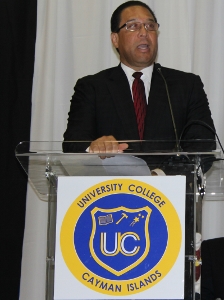
Alden points to election fraud
 (CNS): "Time and again we have heard stories of election fraud, of vote buying – whether its cash in an envelope, a bottle of rum, a new washer or refrigerator," Cayman Islands Premier Alden McLaughlin said at the anti-corruption conference at the UCCI. However, he was not referring to the local polls but elections "the world over". Having emphasised the clean bill of health given to the last general elections in the Cayman Islands by the independent observers, he stated, "We can’t keep ignoring election fraud if we are to truly going to stamp out corruption. Those who are guilty – both the candidate or party and the voter – must own up to it, admit it is wrong and help move their country, its people and the region forward."
(CNS): "Time and again we have heard stories of election fraud, of vote buying – whether its cash in an envelope, a bottle of rum, a new washer or refrigerator," Cayman Islands Premier Alden McLaughlin said at the anti-corruption conference at the UCCI. However, he was not referring to the local polls but elections "the world over". Having emphasised the clean bill of health given to the last general elections in the Cayman Islands by the independent observers, he stated, "We can’t keep ignoring election fraud if we are to truly going to stamp out corruption. Those who are guilty – both the candidate or party and the voter – must own up to it, admit it is wrong and help move their country, its people and the region forward."
Corruption expectations high
 (CNS): The Cayman Islands premier said that while the region has reached the point where people are now saying they will no longer tolerate corruption, everyone believes all politicians are corrupt. Alden McLaughlin said that the expectations that anyone elected to office is a thief are so high that the good politicians are still defined as thieves – but ones who share the gains. Speaking at the opening of the UCCI anti-corruption and ethics conference on Wednesday evening, the premier said things had become so bad that voters no longer expect corruption -free representation. But, he warned, they don't always see corruption for what it is unless it is being committed by supporters of political groups on the other side.
(CNS): The Cayman Islands premier said that while the region has reached the point where people are now saying they will no longer tolerate corruption, everyone believes all politicians are corrupt. Alden McLaughlin said that the expectations that anyone elected to office is a thief are so high that the good politicians are still defined as thieves – but ones who share the gains. Speaking at the opening of the UCCI anti-corruption and ethics conference on Wednesday evening, the premier said things had become so bad that voters no longer expect corruption -free representation. But, he warned, they don't always see corruption for what it is unless it is being committed by supporters of political groups on the other side.
With people only seeing favours, benefits or bribes as bad when others do it, they were perpetuating the culture of tolerance, he said. After more than fourteen years in Cayman politics, the premier said he could say “without hesitation” he had seen and felt the corruption and the damage it does here too.
McLaughlin told the audience of over 250 people that the UCCI ethics conference was an important step as the region seeks to try and change this culture, not just in the political and public arena but in the business community as well. He pointed out the bribes to politicians were paid by or received from them by the private sector paying for what they want.
“We must work collectively to educate and have everyone understand how widespread and how much of a negative impact corruption has on the future of our people,” he said, as he welcomed the conference delegates and those spearheading the fight against corruption, which, he added, benefits only the few and impoverishes the many.
The governor, Helen Kilpatrick, said that good governance was a primary part of her role and it was important that public funds were kept under close scrutiny. Despite the government’s ongoing failure to produce a set of accounts that can be looked at and understood by the public, the governor said the Cayman government was aware of the need to account for public spending properly and to demonstrate value for money.
Kilpatrick said she believed the political arm of government was as keen as she was to see transparency in all public spending decisions.
She also spoke about more transparency in the financial services sector and pointed to the UK leading the way on this with its buy-in to the automatic exchange of tax information sharing and its decision in public disclosure of beneficial ownership. She said that the CIG had just finished its consultation on the issue of beneficial ownership locally, as she applied more subtle pressure about transparency, anti-corruption and promoting an ethical environment with a public register here too.
Welcoming delegates to the UCCI, she said she was pleased to see not just politicians at the conference but the practitioners here who will be taking part, as they were the ones that deliver those services and can make a stand against corruption as the region works toward building culture of integrity and transparency.
Roy Bodden the UCCI president, said it was a pleasure for UCCI to host the conference on such an important issue and to bring it to the fore, helping to make the Caribbean a better place. Bodden said that he hoped everyone would leave with commitment to fight corruption wherever they see it and at whatever cost.
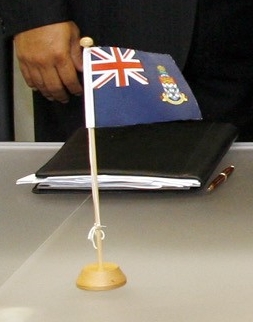
Politicians get more responsibility for foreign affairs
 (CNS): The premier and three other Cabinet ministers have been given new responsibilities relating to relevant areas of external affairs, government officials confirmed Friday. As set down in the constitution, Governor Helen Kilpatrick has agreed to delegate certain responsibility to the politicians relating to various overseas affairs. While this does not allow the ministers to sign treaties without first getting permission from the United Kingdom, they will be able to make decisions and policy in their relevant fields that may involve foreign affairs. Section 55 subsection (4) of the 2009 Cayman Islands Constitution gives the governor the power to delegate responsibility to the premier and ministers to handle certain regional and international affairs.
(CNS): The premier and three other Cabinet ministers have been given new responsibilities relating to relevant areas of external affairs, government officials confirmed Friday. As set down in the constitution, Governor Helen Kilpatrick has agreed to delegate certain responsibility to the politicians relating to various overseas affairs. While this does not allow the ministers to sign treaties without first getting permission from the United Kingdom, they will be able to make decisions and policy in their relevant fields that may involve foreign affairs. Section 55 subsection (4) of the 2009 Cayman Islands Constitution gives the governor the power to delegate responsibility to the premier and ministers to handle certain regional and international affairs.
“This is in keeping with the general delegation under the 2009 Constitution of all matters of policy formulation and implementation to the elected government except for the areas of special responsibility, which remain with the governor,” a release from the premier’s office stated.
Premier Alden McLaughlin has been assigned responsibility for the Caribbean Community, the Association of Caribbean States, the United Nations Economic Commission for Latin America and the Caribbean, or any other Caribbean regional organisation or institution; other Caribbean regional affairs relating specifically to issues that are of interest to or affect the Cayman Islands; and European Union matters directly affecting the Cayman Islands.
The Cabinet Office will coordinate the areas of external affairs delegated to the premier.
Meanwhile, Deputy Premier Moses Kirkconnell has been given responsibility for external affairs with respect to tourism and tourism-related matters, though these were not specified.
Finance Minister Marco Archer will now have responsibility for external affairs relating to taxation, and Financial Services Minister Wayne Panton will now deal with all external affairs with respect to the regulation of finance and financial services.
Under the Constitution, the ministers must keep the governor informed of any activities relating to external affairs responsibilities and any costs associated with those activities that will be paid for by the government.

MLA full disclosure stalled
(CNS): Although government has passed the Standards in Public Life Law, the full disclosure of members and senior civil servants interests’ and that of their families is still some time away. It is not yet clear how the public will get access to the new register, which will require much more information from politicians and, for the first time, senior civil servants. Currently, members of the public must make an appointment to see the register and are not allowed to make copies but can only take notes. CNS visited the Legislative Assembly this week to see the current list of MLAs’, in some cases extensive, business interests and land ownership and, for the first time, has posted the full details as they currently stand of serving members.
On our visit we found a fragmented, disorganised file that has not been updated since Nomination Day, almost twelve months ago. Members declare things in different ways and do not always make their interests very clear on the forms supplied, which are in most cases hand written submissions.
Wayne Panton, the chair of the Register of Interests Committee, told CNS that as the new law will hand responsibility to the Standards in Public life Commission, he had not called a meeting, though he had directed all members to update their register and ensure it was accurate.
He said, however, that he would look into the current register and ensure it was accurate and that its presentation to the public was improved until the new law’s regulations were complete and the function handed over to the commission.
Although the members' register may have reflected an accurate record of their business interests, property and land ownership, directorships and share holdings, the files are not easily accessible to the public, and despite the new law, it may not improve in the future unless the register is available via a web portal.
Deborah Bodden, a spokesperson for the current Standards in Public Life Commission, revealed that the new register that the commission will oversee may not necessarily be posted online as the law does not specifically provide for them to be made available on a website, only that they will be available to the public. However, nothing has yet been confirmed and the clock is ticking on the law’s requirement that each year all politicians and civil service heads make full disclosure within thirty days of 30 June.
Bodden said options were being explored for some kind of programme to create a searchable database so the public can look for specific details about their MLAs or senior public servants but there was no certainty yet about how the register would be accessible.
Bodden said last week that the regulations were not yet complete and so far, following the departure from the commission of Karin Thompson, who had overseen the long journey to the legislation, a new chair and other members had not yet been appointed.
With the public often suspicious about the motivations of politicians, the decisions they make and the policies they develop, the need to see who owns what and who has an interest in what is an important tool in the fight against corruption.
During the previous UDP administration there was considerable speculation about land owned by some government MLAs and their family members in areas related to projects approved by the government. In addition, business interests were also said to have been passed on to family or friends while they took up their seats in the LA, allowing them to avoid disclosure.
The recent controversies surrounding the potential extension of the east-west arterial road in order to support a proposed retirement community development and golf course in North Side has led to concerns about this administration and that some serving politicians' and civil servants' family members could stand to benefit from this extension and project.
A number of politicians and senior civil servants, including the premier, the planning minister and the former deputy governor, are all said to have family land interests connected to the road or the project.
At present, politicians are not required to reveal any details about the financial or business interests, land or property ownership of their spouse or other close family members, just their own business interests and property or land.
Currently there is no requirement even for the deputy governor, who sits in the LA, or any other civil service head to reveal their interests either. However, Samuel Bulgin, the attorney general, has filed a register stating that he had apartments in Florida, Jamaica and in Cayman, as well as land in North Side.
According to the register, as it currently stands the deputy premier has by far the most interests and property of members sitting on the government front bench.
Deputy Premier Moses Kirkconnell, who is also minister for tourism and district administration on the Sister Islands, has more than fourteen directorships in companies for which he has shares and receives financial payments, most of which are tourism or real estate related. He also owns more than two dozen parcels of land on Cayman Brac and three lots on Little Cayman.
Planning Minister Kurt Tibbetts lists three business interests and several lots of land in Spotts, Savannah, Lower Valley, West Bay, Cayman Brac and Little Cayman.
Financeial Services Wayne Panton has a number of business interests, including investment and holding companies and property development, as well as Infinity Broadband, the owners of c3, the latest broadband and communication company to receive a license to supply internet TV. He also declares owning land in Savannah and rental properties.
Although Finance Minister Marco Archer declares no business interests, he declares holding land in North Side, Breakers, Spotts and West Bay, while Health Minister Osbourne Bodden declares his gas station in Bodden Town, a George Town shop as well as land and property in his constituency and the Sister Islands. Tara Rivers declares interest in just one business and land in her constituency. Premier Alden McLaughlin declares his own legal practice and just one lot of land in Spotts.
See full details of the business, shares and land interests currently declared by all 18 members of the Legislative Assembly below.
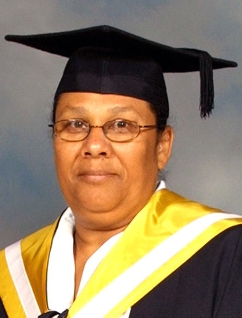
Chief Officer retired out
 (CNS) Updated 1:45pm Friday:Officials have now confirmed that the chief officer in the Finance Ministry will formally retire from the civil service in September but that she is currently on "extended pre-retirement leave". CNS revealed Friday morning that Sonia McLaughlin had left her senior post and at 1:30pm GIS issued a release. However, there has been no official confirmation on the financial secretary taking up her post though he is understood to have assumed her duties in the meantime. McLaughlin has presided over the public finances for a decade, during the time when government has struggled to meet its obligations under the Public Management and Finance Law to produce a set of accounts, reporting what it collects from tax payers and how it spends it.
(CNS) Updated 1:45pm Friday:Officials have now confirmed that the chief officer in the Finance Ministry will formally retire from the civil service in September but that she is currently on "extended pre-retirement leave". CNS revealed Friday morning that Sonia McLaughlin had left her senior post and at 1:30pm GIS issued a release. However, there has been no official confirmation on the financial secretary taking up her post though he is understood to have assumed her duties in the meantime. McLaughlin has presided over the public finances for a decade, during the time when government has struggled to meet its obligations under the Public Management and Finance Law to produce a set of accounts, reporting what it collects from tax payers and how it spends it.
The announcement of McLaughlin’s departure was understood to have been made to senior civil service staff this week. CNS understands that other public sector workers are also being paid off but no details have yet been released.
Cayman News Service sent questions to the deputy governor’s office on Wednesday morning relating to these lay-offs, as well as asking what was happening with two other senior civil servants that are understood to still be on payroll. We asked Franz Manderson if Diane Montoya and Deborah Drummond remained on the civil service pay roll and what their current circumstance are in relation to potential new posts. Both women were casualties of the UDP‘s shake up of ministries when the party took office in 2009 and neither has been given a full time post since, despite remaining on top tier salaries.
Manderson acknowledge receipt of CNS’ enquiry on the day (12 March) when he received the request and stated that he would “provide a considered response shortly”.
CNS will post all details from the deputy governor as soon as we are in receipt.
See release from GIS regarding McLaughlin's retirement.

80% of whistleblowers sacked
 (CNS): Civil servants have told the Office of the Complaints Commissioner (OCC) that they are extremely reluctant to report wrongdoing in government due to significant fears of reprisals against them and their families and believe that no one is ever punished or held accountable, even when reports are made about wrongdoing. Complains Commissioner Nicola Williams found in a new report released Thursday that even though public sector workers recounted numerous instances of intimidation, victimization and reprisals against whistleblowers, chief officers claimed to be unaware of such issues. In the cases used for the report 80% of whistleblowers in the Cayman Islands Government lost their jobs while the other 20% were transferred, demoted or overlooked for promotion.
(CNS): Civil servants have told the Office of the Complaints Commissioner (OCC) that they are extremely reluctant to report wrongdoing in government due to significant fears of reprisals against them and their families and believe that no one is ever punished or held accountable, even when reports are made about wrongdoing. Complains Commissioner Nicola Williams found in a new report released Thursday that even though public sector workers recounted numerous instances of intimidation, victimization and reprisals against whistleblowers, chief officers claimed to be unaware of such issues. In the cases used for the report 80% of whistleblowers in the Cayman Islands Government lost their jobs while the other 20% were transferred, demoted or overlooked for promotion.
Williams said in her Own Motion Investigation, entitled “Let the whistle blow", that having no policies or law to protect whistleblowers in government undermines their ability to comply with the Public Service Management Law and fuels public sector corruption.
Having investigated what protective measures were in place for whistleblowers or people who report wrongdoing that they have witnessed in the work place, especially by their superiors or politicians, Williams said there was no adequate protection and has made a number of recommendations in her report.
Calling for stand-alone legislation and government policy, a positive duty to report, encouragement of civil servants to report, accountability when wrongdoers are exposed, confidentiality assurances and a hot line, the commissioner said government should begin an education campaign and even consider appointing a minister for public service and integrity.
Williams said she and her team examined existing legislation, policies and the work culture and the tolerance of wrongdoing in the first place, as well as what has happened to those who have blown the whistle.
During the investigation into the report the OCC found that most of the whistleblowing that people had reported related to financial irregularities. However, all of the civil servants interviewed for the report who said they had blown the whistle said they found themselves penalized, while those who were responsible for the wrongdoing remained in the jobs continuing the same practices unchecked. With whistleblowers exposed and the wrongdoers left in post, these government employees who did the right thing have also suffered victimization.
Williams found that Cayman’s small society was one of the problems that prevented people from whistleblowing, as there seemed to be numerous ways that those who report wrongdoing can be victimized outside of work as well as in and that their future prospects of work if they leave government were also at risk.
Concerns that whistleblowers, not the wrongdoers, are being punished fuels corruption. With no policies or systems in place for reporters, Williams found civil servants asking simply, “What happens to me?” if they reveal what they know.
Despite recommendations made almost six years ago following the report into documents leaked by former permanent secretary Charles Clifford, there is still little or no protection for whistleblowers in the Cayman Islands government. Many believe making a complaint about a colleague, boss or politician is simply career suicide.
The absence of a safe comprehensive system underpinned by legislation that is enforced does not just impact employees of government but the wider community, Williams said in her report, which lays out detailed recommendations and the need for stand-alone legislation to deal with this issue as part of the overall goal to improve good governance in general.
See full report below.
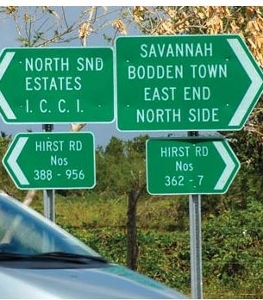
NRA not party to road MOU
 (CNS): An FOI request sent to the relevant ministry and the National Roads Authority on Monday revealed that government did not include that agency in the Memorandum of Understanding it signed with developers regarding a potential public-private partnership (PPP) over a major public road extension. As a result of government’s silence on media requests for a copy of this MOU, CNS submitted a formal FOI request for the document, which is of significant public interest but which government seems reluctant to reveal. When we did we were informed by the NRA information manager that the authority did not hold the relevant document and referred us to the ministry.
(CNS): An FOI request sent to the relevant ministry and the National Roads Authority on Monday revealed that government did not include that agency in the Memorandum of Understanding it signed with developers regarding a potential public-private partnership (PPP) over a major public road extension. As a result of government’s silence on media requests for a copy of this MOU, CNS submitted a formal FOI request for the document, which is of significant public interest but which government seems reluctant to reveal. When we did we were informed by the NRA information manager that the authority did not hold the relevant document and referred us to the ministry.
CNS has contacted the NRA management and board as well as the ministry to ask why the roads authority is not party to an agreement in which government has committed in principle to a partnership that will result in the extension of the east-west arterial to Frank Sound. However we have received no reply from any of those contacted.
The MOU, which was signed by government and the developers of a proposed mixed use retirement community last month, has remained under wraps but it relates to the possibility of the owners behind the potential Ironwood development financing the $40 million road extension via duty waivers.
The developers have said the mixed used retirement community, resort and golf course is contingent on the road, which has already stirred significant controversy as a result of the extension's route through National Trust property, including the naturally, historically and culturally significant Mastic Reserve. In addition, the proposed community is believed to pose a threat to the fresh water lens in the area and the Queen Elizabeth Botanic Garden as the potential development borders that royal park’s land.
Despite this the MOU that government signed at a cocktail party at the Westin without revealing the contents to the public, it is understood that the deal commits government to undertaking the necessary business case studies and analysis with a view to a PPP on the road extension, which will still ultimately be paid for by the public purse.
Sources close to the NRA have also revealed that the statutory authority doesn’t consider this project a priority because besides the request from the developer, there is at present no justification to invest in that extension.
There are also now new concerns that if the east-west arterial went ahead at this time, with the arrival of the Shetty hospital in East End, the more southern route, which was gazetted in the 1990s as part of the grand master transportation plan, would be a more appropriate location for the road that the one gazetted in 2005, which follows the more northerly route, threatening the National Trust land.
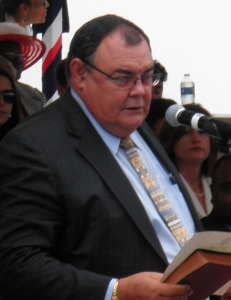
Miller begins work on bill
 (CNS): The independent member for North Side has begun his preparations on a private member's bill that he says he will bring to the Legislative Assembly before the end of the year if government continues on its U-turn over introducing 'one man, one vote' (OMOV) in single member constituencies (SMCs). Ezzard Miller said he has had preliminary discussions with the attorney general, and although he and East End member Arden McLean, who brought the private member's motion, which was narrowly rejected, appreciate the numbers, they remained hopeful that some members of the government benches will remember their campaign promises and help its passage.
(CNS): The independent member for North Side has begun his preparations on a private member's bill that he says he will bring to the Legislative Assembly before the end of the year if government continues on its U-turn over introducing 'one man, one vote' (OMOV) in single member constituencies (SMCs). Ezzard Miller said he has had preliminary discussions with the attorney general, and although he and East End member Arden McLean, who brought the private member's motion, which was narrowly rejected, appreciate the numbers, they remained hopeful that some members of the government benches will remember their campaign promises and help its passage.
As is allowed under the LA’s standing orders, although they are not part of government, Miller and McLean intend to draw up the full necessary legislation with the help of government legal drafters, which they will need to pay for themselves, to change the elections law and introduce SMCs with OMOV, as per the parameters of the July 2012 referendum, and then put it to the vote.
Miller told CNS this week that he was bitterly disappointed with the government’s reaction to McLean’s motion, which was debated in the Legislative Assembly last month and saw the premier reveal that government would be pursuing a hybrid system of 'at large' candidates and single member constituencies, giving voters not one vote in SMCs but four or possibly five votes in combination of SMCs and a national slate. Miller said that many people had told them that they were shocked by the premier’s decision to defend his post and keep his government in office rather that fulfill his campaign promise.
He said there could be no question that one of the issues on which the current government was elected was OMOV in SMCs. The turnaround was damaging, he said, and had led to mistrust in the community and the government had lost considerable political capital, especially coming in the wake of government’s regression on the matter of a minimum wage as well. He said that integrity in government was not “merely the absence of stealing money” but also keeping one's word.
“We must see this newfangled idea of 'at large' candidates for what it really is – to increase representation in government from George Town and another way for politicians to use each other’s coattails to get elected,” the North Side representative said.
Committed to drawing up the bill, despite the prospect of defeat, Miller said the public could help by contacting their representatives and demanding that they fulfill their election promises on the issue. He said this might persuade enough of the government benches that this is the right thing to do, regardless of their party or government loyalties.
Miller, who said he has been campaigning for OMOV, has raised considerable concerns about the governments U-turn being merely a ploy to delay the implementation of a new voting system by coming up with distraction that will drag the process out for so long that the 2017 election will be fought on the same grounds as that of 2013.
During his contribution to the debate he had pointed out that he had supported SMCs since the 1970s, when he began the fight as a high school student. He said the only reason Cayman still does not have OMOV in SMCs is because of politicians. For fifty years, Miller stated, they had continued to do what was best for politicians and not what is best for the people.
“SMCs are better for the people but not politicians and that is the stumbling block,” he said. “Politicians continue to be afraid of the accountability that comes with SMCs”
Puzzled by Alden McLaughlin’s declarations that the C4C members in his government, who werein a minority, had threatened to being down the Progressives administration, he pointed out that even if they had crossed the floor the government would win a no confidence motion as it was still a majority.
Miller promised to do everything he could to campaign against 'at large' candidates as he said they were unfair and just another way to tip the balance in favour of the capital influencing government. He said multiple voting distorted equality, especially when people could manipulate their vote. One vote cannot be manipulated; it can be cast for one candidate or it can be withheld, he pointed out.
He also questioned the suggestions of the premier that small constituencies throw up “bizarre results” and lead to corruption, vote buying or simply buying the whole election with a slick campaign. He said that each of the four elections he had won in North Side he had spent less than his opponents and had not bought any votes
Although Miller does not subscribe to any of the ills that government is now rolling out about SMCs, he said that even if they existed, reducing the constituencies from 18 to 15 would hardly make much difference. He also criticised government for not admitting which demographic group of Caymanians it was concerned about when McLaughlin had raised the issue of weird results in certain communities in George Town. Miller said the only people who can vote are Caymanian and status holders can’t run for office. If people picked second generation Caymanians from their own ethnic group to represent them, then that was their democratic right, he said.
If a candidate was a Caymanian, even if his parents were born in the Philippines, Jamaica or Canada, he had a right to run for office and the people in his constituencies had a right to vote or not vote for him regardless of their own ethnicity. Such comments from government as a reason to try and manipulate the electoral system were very dangerous, Miller warned, as he pointed to the Bill of Rights.
Attacking the government’s complaints of parties or candidates dominating small constituencies, he pointed to Arden McLean, who ran in a party twice and won and then as an independent and won. People simply don’t get elected if they do not represent the interests of the people of their constituencies, he said.